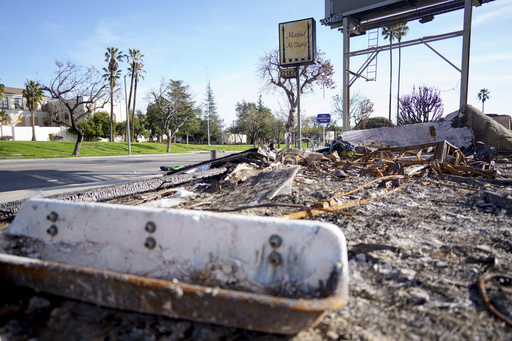
PASADENA, California — Masjid Al-Taqwa, a prominent mosque located in Altadena, has been reduced to ashes, leaving behind only a sign that marks its existence. The mosque had been a vibrant center for a close-knit Muslim community for 42 years until it fell victim to one of the deadliest fires in the Los Angeles region in January. This devastating incident has left its congregation mourning and without a place to gather for prayers, particularly with the arrival of Ramadan approaching.
In light of their current situation, a group of about 20 mosque members and several families connected to the community gathered at a nearby Islamic school on a recent Saturday. They met not just to pray, but to share their first meal together since the tragic fire. Many attendees are temporarily residing in motels or staying with relatives after losing their homes in the Eaton fire, which claimed 17 lives and burned thousands of properties along with over 14,000 acres of land in Los Angeles County.
As Ramadan draws near, the community received uplifting news from their volunteer imam, Junaid Aasi. Dressed in a white robe, black jacket, and prayer cap, he entered the multipurpose room at New Horizon Islamic School and set up a small karaoke machine in the center of the plush blue prayer rugs. Aasi announced that the school would offer its space for prayers four nights a week during Ramadan, prompting gasps of relief and expressions of gratitude among the attendees, uttering “Alhamdulillah,” which means “praise be to God.”
Aasi noted that with Ramadan fast approaching, the community felt anxious about how they would gather without their mosque. He emphasized the importance of this gathering, especially given that many members have suffered significant losses in recent months. “Ramadan is not just a time for prayer and meals, but also for helping and supporting one another and the wider community,” he stated.
Having been involved with the mosque for the past quarter-century while also working in IT, Aasi mentioned he often reflects on the memories associated with the mosque. He can still vividly recall the spots designated for wudu — the ritual washing before prayer, the lush carpets used for prayer, the copies of the Quran, and even a fig tree that stood outside. “I still can’t believe it’s all gone,” he added.
The emotional toll on the community members is substantial, with many still displaced by the fire and grappling with their losses. One member confided that they hesitated to attend the gathering in order to stop by their torched home, a decision that led to an overwhelming wave of emotions.
Aaron Abdus-Shakoor, one of the mosque’s founders and the current board president, expressed his own hardships, having lost not only his residence but also the building housing his real estate business and multiple investment properties in the area. Acknowledging the mosque’s origin in the 1970s as a meeting space for Nation of Islam members, he shared how it eventually grew into a diverse and inclusive Muslim community that was renamed Masjid Al-Taqwa in 1997, which translates to “pious and god-conscious.”
Abdus-Shakoor reflected on the mosque’s commitment to being a positive influence in the community, noting that celebrations meant to unify the congregation have definitely adapted over the years. Previously, communal Ramadan celebrations only occurred on Eid al-Fitr, which marks the conclusion of the holy month. Nowadays, members participate in daily iftar dinners during Ramadan, the meal that breaks the fast.
For many, the mosque represented a second home. Salah Eddine Benatia, who has recently immigrated from Algeria, emphasized the warmth of the community he discovered shortly after arriving in the United States. “I felt so warmly welcomed by this community,” he said. Faced with feelings of homesickness during Ramadan, he expressed sadness upon hearing about the mosque’s destruction, stating that being in the community provided him with a familial connection.
Longtime community member Farzana Asaduzzaman fondly recounted how Ramadan gatherings at the mosque had always been family-oriented. These gatherings would involve sharing meals, children playing games, creating arts and crafts, and sipping hot chai while engaging in long conversations. Asaduzzaman and her family also lost their home in the fire, which they had spent two and a half years renovating before it was destroyed. Yet, she remains hopeful, affirming that regardless of their circumstances, the community’s spirit will endure, emphasizing that they will gather again for Ramadan.
For Mohammed AlDajani, a second-year medical student, the mosque was conveniently located just a five-minute walk from his home, which was also lost in the tragedy. He highlighted how Masjid Al-Taqwa met his needs for both social interaction and spiritual fulfillment. AlDajani appreciated the mosque’s diversity, which brought together individuals from various nationalities and ethnic backgrounds, making it truly unique.
Reflecting on last year’s Ramadan, he recalled how the mosque’s youth painted a mural of Al-Aqsa Mosque, which deeply resonated with him as a Palestinian American amid the ongoing conflict in the region. He learned of the mosque’s destruction on the same day that he discovered his own home was gone, which was an emotionally overwhelming experience for him.
Despite the ongoing challenges, AlDajani finds solace in the support of his mosque community. He noted that prayer groups still meet on the weekends and that community members have reassured one another about gathering during Ramadan. “It’s nice to know we’ll still be able to gather and pray,” he reflected.
Sakeenah Ali expressed her sadness over the loss of the mosque, especially as her children attended school nearby and had special ties to the call to prayer that they would hear in the afternoons. She vividly remembers witnessing the fire, with cars alight and debris scattered. Yet, Ali believes in the resilience of her community. “The key is to keep showing up, stay connected, and be consistent. We are going to rebuild,” she declared, emphasizing the strength and unity within the community.

